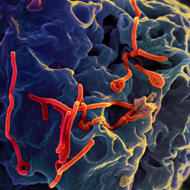
Most survivors still showing brain symptoms
A new study of 82 Ebola survivors has revealed that most were still suffering from neurological abnormalities more than six months are the initial infection.
US researchers from the National Institute of Neurological Disorders and Stroke (NINDS) studied a group of survivors from Liberia, with an average age of 35.
The most common ongoing symptoms they found were weakness, headaches, memory loss, depressed mood and muscle pain. Two survivors were suicidal and another was having hallucinations.
Common neurological signs found on examination were abnormal eye movements, tremors and abnormal reflexes.
Researchers are in the process of evaluating controls to determine which of these signs are Ebola-specific.
During the Ebola outbreak in West Africa more than 28,600 people were infected, of which 11,300 died, leaving 17,000 survivors.
Study author Lauren Bowen, from the National Institute of Neurological Disorders and Stroke, said: "It is important for us to know how this virus may continue to affect the brain long term".
The research forms part of a larger Prevail III study which follows patients who have had prior Ebola virus diseases, as well as their close contacts. The preliminary findings will be presented at the American Academy of Neurology's 68th annual meeting in Vancouver in April this year.
Image credit: NIAID/CC BY 2.0



 The Veterinary Medicines Directorate (VMD) is inviting applications from veterinary students to attend a one-week extramural studies (EMS) placement in July 2026.
The Veterinary Medicines Directorate (VMD) is inviting applications from veterinary students to attend a one-week extramural studies (EMS) placement in July 2026.